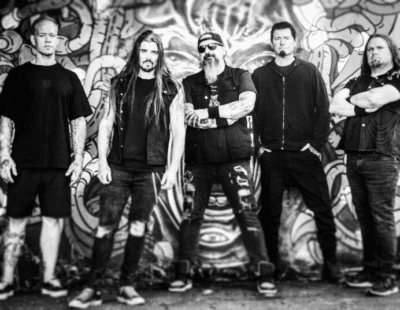
All musical scenes have their roots; the points of origin that help signify that “this must be death metal” or “nope, this is definitely black metal.” For most black metal, this means that the lyrics are propped up by the muse of evil, darkness, nihilism and the occult. As for the music itself: cold, grim and dark. But it’s not the early 1990s any more, and the genre’s diverse array of dovotees have since taken it many different directions. Atmospheric black metal is one of the most prominent offshoots, and usually has something to do with trees and only ever using beats that have that distinct flowing quality. However, there are a few German bands injecting some fresh life into this now well-established template.
One of the newer bands active in this realm is Der Rote Milan, who come from Trier, a city in western Germany near the border with Luxembourg. Their latest album, Moritat (meaning “ballad”), will arrive in February 1 via Unholy Conspiracy Deathwork. So far, the band has released the song, “Die Habsucht” (“the greed”) and a music video for “Drohende Schatten” (“threatening shadows”), both of which show the band’s ability to craft introspective music that still brings on heaps of blasting aggression.
Like their countrymen in Schattenfall, Der Rote Milan have a guitar tone that evokes a massive rainstorm, but with perhaps more thunder involved. And like that other great German band, Eïs, they’re able to use the tools of 2nd-wave black metal and create something that’s more than just a safe retread. However, it also retains enough of that style’s power to note slip into “experimental” or “avant-garde” territory.
Another interesting feature of this album is its lyrical inspiration. According to the band, much of Moritat is derived from the history of the Thirty Years’ War (1618-1648), a conflict which began as a religious war between individual German states that eventually exploded into warfare between rival coalitions of European powers. The war was absolutely devastating for the region, and nearly bankrupted most of the belligerents, entangled in complex alliances and bled into drafting the Peace of Westphalia (a document that some say laid the foundation for modern diplomacy, and which others claim laid the foundation for the First and Second World Wars). It’s a conflict that bears a striking resemblance to modern events, making it a very relevant area of artistic exploration.
But there’s also a more colorful piece of inspiration behind this album, a historical figure known as Schinderhannes, who lived from 1778-1803 and is known as Germany’s most famous robber and thief. He’s remembered as a bit of a folk hero as well, as many of his robberies took place on the western side of the Rhine river, occupied by the French since a revolutionary-era war with Prussia. This made him known as basically the “German Robin Hood.” Managing a cunning prison escape and later being executed in front of 40,000 onlookers probably helped cement his status as well.
Although I can’t tell exactly how the band weaves both subjects together on this album without access to the lyric sheet, it’s still encouraging to see black metal bands mine compelling stories from history. I have nothing against going about black metal the old way, but a good story is still a good story.
Enjoy the video for “Drohende Schatten” below:







